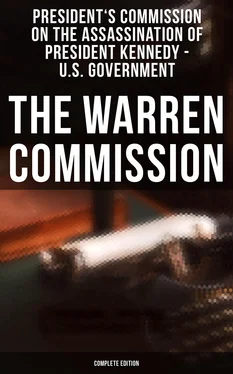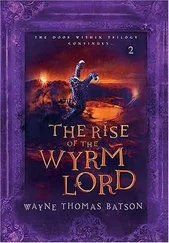Mr. Rankin. Was this a change in his attitude?
Mrs. Oswald. Towards me or towards Russia?
Mr. Rankin. Towards going to Russia.
Mrs. Oswald. I don't think that he was too fond of Russia, but simply that he knew that he would have work assured him there, because he had—after all, he had to think about his family.
Mr. Rankin. Did you know that he did get a passport?
Mrs. Oswald. It seems to me he always had a passport.
Mr. Rankin. While he was in New Orleans, that he got a passport?
Mrs. Oswald. Well, it seems to me that after we came here, he immediately received a passport. I don't know. I always saw his green passport. He even had two—one that had expired, and a new one.
Mr. Rankin. Do you know when the new one was issued?
Mrs. Oswald. No. It seems to me in the Embassy when we arrived. I don't know.
But please understand me correctly, I am not hiding this. I simply don't know.
Mr. Rankin. Do you know about a letter from your husband to the Embassy asking that his request for a visa be considered separately from yours?
Mrs. Oswald. No, I don't.
Mr. Rankin. When you were at New Orleans, did your husband go to school, that you knew of?
Mrs. Oswald. No.
Mr. Rankin. Did he spend his earnings with you and your child?
Mrs. Oswald. Most of the time, yes. But I know that he became active with some kind of activity in a pro-Cuban committee. I hope that is what you are looking for.
Mr. Rankin. When did you first notice the rifle at New Orleans?
Mrs. Oswald. As soon as I arrived in New Orleans.
Mr. Rankin. Where was it kept there?
Mrs. Oswald. He again had a closet-like room with his things in it. He had his clothes hanging there, all his other belongings.
Mr. Rankin. Was the rifle in a cover there?
Mrs. Oswald. No.
Mr. Rankin. Did you notice him take it away from your home there in New Orleans at any time?
Mrs. Oswald. No. I know for sure that he didn't. But I know that we had a kind of a porch with a—screened-in porch, and I know that sometimes evenings after dark he would sit there with his rifle. I don't know what he did with it. I came there by chance once and saw him just sitting there with his rifle. I thought he is merely sitting there and resting. Of course I didn't like these kind of little jokes.
Mr. Rankin. Can you give us an idea of how often this happened that you recall?
Mrs. Oswald. It began to happen quite frequently after he was arrested there in connection with some demonstration and handing out of leaflets.
Mr. Rankin. Was that the Fair Play for Cuba demonstration?
Mrs. Oswald. Yes.
Mr. Rankin. From what you observed about his having the rifle on the back porch, in the dark, could you tell whether or not he was trying to practice with the telescopic lens?
Mrs. Oswald. Yes. I asked him why. But this time he was preparing to go to Cuba.
Mr. Rankin. That was his explanation for practicing with the rifle?
Mrs. Oswald. Yes. He said that he would go to Cuba. I told him I was not going with him—that I would stay here.
Mr. Rankin. On these occasions when he was practicing with the rifle, would they be three or four times a week in the evening, after the Fair Play for Cuba incident?
Mrs. Oswald. Almost every evening. He very much wanted to go to Cuba and have the newspapers write that somebody had kidnapped an aircraft. And I asked him "For God sakes, don't do such a thing."
Mr. Rankin. Did he describe that idea to you?
Mrs. Oswald. Yes.
Mr. Rankin. And when he told you of it, did he indicate that he wanted to be the one that would kidnap the airplane himself?
Mrs. Oswald. Yes, he wanted to do that. And he asked me that I should help him with that. But I told him I would not touch that rifle.
This sounds very merry, but I am very much ashamed of it.
Mr. Rankin. Did you tell him that using the rifle in this way, talking about it, was not in accordance with his agreement with you?
Mrs. Oswald. Yes.
Mr. Rankin. What did he say about that?
Mrs. Oswald. He said that everything would go well. He was very self-reliant—if I didn't want to.
Mr. Rankin. Was there any talk of divorce during this period?
Mrs. Oswald. No. During this time, we got along pretty well not counting the incidents with Cuba. I say relatively well, because we did not really have—generally he helped me quite a bit and was good to me. But, of course, I did not agree with his views.
Mr. Rankin. At this time in New Orleans did he discuss with you his views?
Mrs. Oswald. Yes.
Mr. Rankin. What did he say about that?
Mrs. Oswald. Mostly—most of the conversations were on the subject of Cuba.
Mr. Rankin. Was there anything said about the United States—not liking the United States.
Mrs. Oswald. No. I can't say—he liked some things in Russia, he liked some other things here, didn't like some things there, and didn't like some things here.
And I am convinced that as much as he knew about Cuba, all he knew was from books and so on. He wanted to convince himself. But I am sure that if he had gone there, he would not have liked it there, either. Only on the moon, perhaps.
Mr. Rankin. Did he tell you what he didn't like about the United States?
Mrs. Oswald. First of all, he didn't like the fact that there are fascist organizations here. That was one thing.
The second thing, that it was hard to get an education and hard to find work. And that medical expenses were very high.
Mr. Rankin. Did he say who he blamed for this?
Mrs. Oswald. He didn't blame anyone.
Mr. Rankin. Did he ever say anything about President Kennedy?
Mrs. Oswald. No. At least—I was always interested in President Kennedy and had asked him many times to translate articles in a newspaper or magazine for me, and he always had something good to say. He translated it, but never did comment on it. At least in Lee's behavior—from Lee's behavior I cannot conclude that he was against the President, and therefore the thing is incomprehensible to me. Perhaps he hid it from me. I don't know. He said that after 20 years he would be prime minister. I think that he had a sick imagination—at least at that time I already considered him to be not quite normal—not always, but at times. I always tried to point out to him that he was a man like any others who were around us. But he simply could not understand that.
I tried to tell him that it would be better to direct his energies to some more practical matters, and not something like that.
Mr. Rankin. Can you tell us what you observed about him that caused you to think he was different?
Mrs. Oswald. At least his imagination, his fantasy, which was quite unfounded, as to the fact that he was an outstanding man. And then the fact that he was very much interested, exceedingly so, in autobiographical works of outstanding statesmen of the United States and others.
Mr. Rankin. Was there anything else of that kind that caused you to think that he was different?
Mrs. Oswald. I think that he compared himself to these people whose autobiographies he read. That seems strange to me, because it is necessary to have an education in order to achieve success of that kind. After he became busy with his pro-Cuban activity, he received a letter from somebody in New York, some Communist—probably from New York—I am not sure from where—from some Communist leader and he was very happy, he felt that this was a great man that he had received the letter from.
You see, when I would make fun of him, of his activity to some extent, in the sense that it didn't help anyone really, he said that I didn't understand him, and here, you see, was proof that someone else did, that there were people who understood his activity.
Читать дальше












